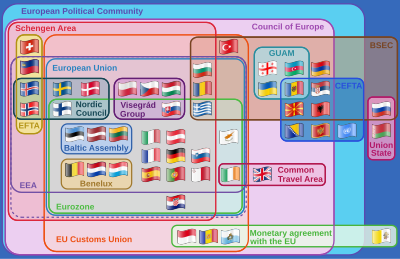Differentiated integration (DI) is a mechanism that gives countries the possibility to opt out of certain European Union policies while other countries can further engage and adopt them. This mechanism theoretically encourages the process of European integration. It prevents policies that may be in the interest of most states to get blocked or only get adopted in a weaker form.[1] As a result, policies are not implemented uniformly in the EU. In some definitions of differentiated integration, it is legally codified in EU acts and treaties, through the enhanced cooperation procedure, but it can also be the result of treaties which have been agreed to externally to the EU's framework, for example in the case of the Schengen Agreement.[2]

An Euler diagram showing the relationships between various multinational European organisations and agreements
- ^ Bellamy, Richard; Kröger, Sandra (2017-07-29). "A demoicratic justification of differentiated integration in a heterogeneous EU". Journal of European Integration. 39 (5): 625–639. doi:10.1080/07036337.2017.1332058. hdl:10871/27757. ISSN 0703-6337. S2CID 73708439. Archived from the original on 2024-05-14. Retrieved 2023-04-19.
- ^ Schimmelfennig, Frank; Winzen, Thomas (March 2014). "Instrumental and Constitutional Differentiation in the European Union". JCMS: Journal of Common Market Studies. 52 (2): 357. doi:10.1111/jcms.12103. ISSN 0021-9886. S2CID 153796388. Archived from the original on 2023-04-19. Retrieved 2023-04-19.